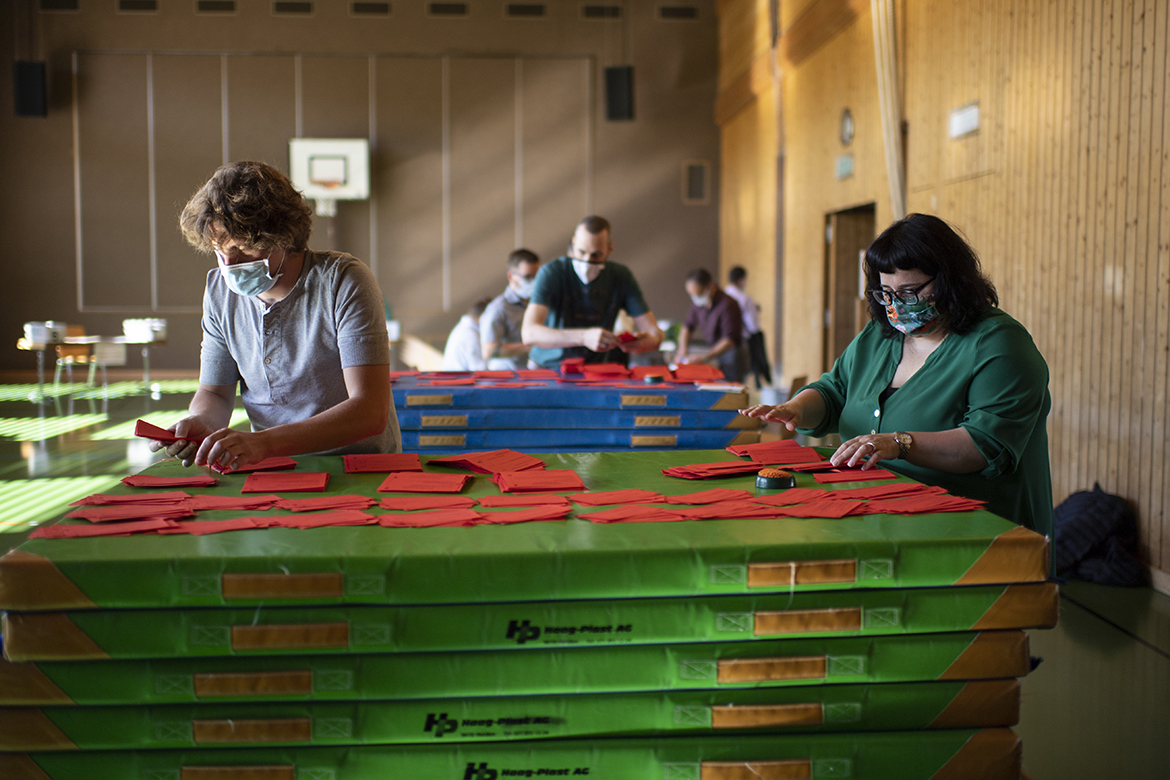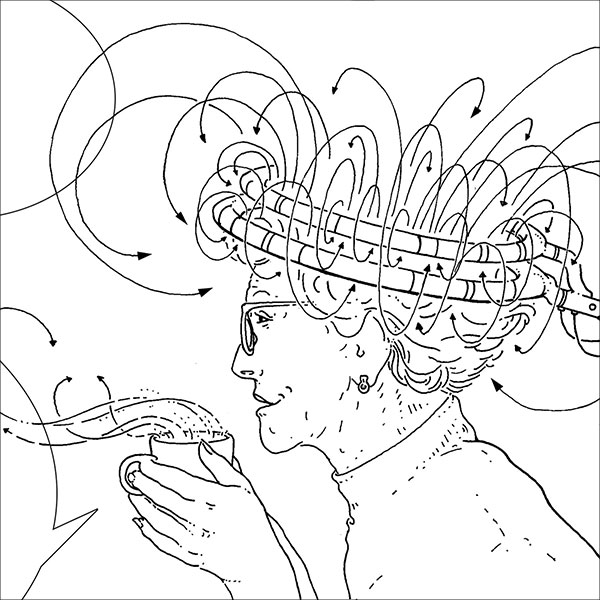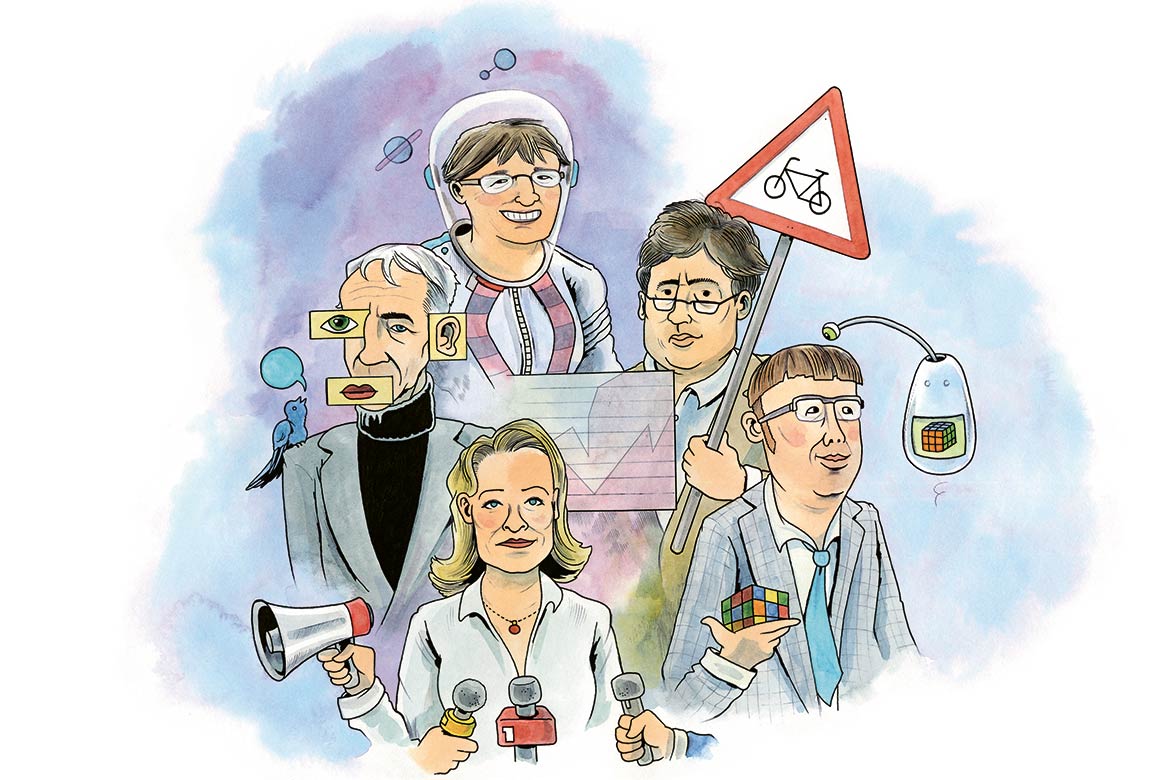DIGITALISATION
Brave new democracy?
More opportunities for political participation, but also a bigger impact for fake news. Researchers are grappling with the challenges that digitalisation poses to Swiss democracy.

Vote-counters at work: debate and participation are the backbone of direct democracy, explains political scientist Urs Bieri. | Image: Ehrenzeller/Keystone
Signing a petition on your smartphone at breakfast, then supporting an online proposal to convert the old village school, and quickly voting for parliament on your laptop before it’s time to sleep: Digitalisation is now marching in on democratic processes too. The motto coined by Facebook founder Mark Zuckerberg – “move fast and break things” – can have a devastating effect. Democracy is moving into the digital space, and the opportunities and risks involved will have to be carefully understood and assessed.
In Switzerland, voting over the Internet has been in the spotlight for a long time already. Electronic voting systems have been tested in various cantons over a space of nearly 20 years. But in 2019, serious security gaps emerged that allowed for electoral manipulation. So efforts to digitalise were put on hold for the time being. This year, the Federal Chancellery is making a new attempt. “But digital democracy goes far beyond e-voting”, says Uwe Serdült of the Centre for Democracy Studies Aarau (zda), who is researching into the impact of digital technologies on democracy. “It also encompasses political education, digitally supported decision-making and the transparency of administration and parliament”.
It is difficult to judge just how far digital democracy has already progressed in any one country, and there is no consistent definition of it. As part of the ‘Index of digital political participation’, Serdült is examining “the extent to which the dialogue among the population, civil organisations and government agencies is made easier by the Internet in the different phases of the political process”.
The United Nations use the E-Participation Index to measure how well the public is involved in decision-making processes by means of digital information and consultation. Switzerland ranks in the middle of the pack in a European context, where it is currently sitting in tenth place. The E-Government Development Index also measures how well administrative processes can be carried out online. Here, too, Switzerland ranks tenth in Europe.
Honing the digital senses
There are obvious advantages to a digital democracy. It lets more people participate in the political process because they can support and even help to shape different projects and initiatives. This can also help those who might otherwise be excluded from democracy, such as immigrant women or people with disabilities. Thanks to services such as ‘Smartvote’, voters can easily find the candidates that suit them, and they can use ‘Lobbywatch’ to check on the vested interests of their elected politicians. Digital tools could also help public authorities to achieve a better understanding of the needs of their population.
It seems odd that e-voting plays a subordinate role in all this, given the amount of time and energy that has been spent discussing it. “Our research shows that e-voting hardly changes the political landscape”, says Serdült. Electronic voting has no noticeable impact on either voter turnout or voting behaviour.
The situation is different with ‘e-collecting’ – that’s collecting signatures for referendums and initiatives over the Internet. During lockdown, it was difficult collect signatures on the street – at times it was even forbidden by law. Platforms such as ‘wecollect’ can help people to collect signatures on the Internet. But it is still impossible to ‘sign’ an initiative online. “With e-collecting, more initiatives could be put to a vote”, says Serdült. But he warns that there are other possible consequences of this. It could also mean more work for parliament, and more issues that have to be voted on by the population.
“It is an open question as to what could happen to our direct democracy if we end up voting four times each year on fifteen different proposals”, says Serdült. Voters should be able to make informed, free decisions when voting on laws and constitutional amendments. But not everyone has the desire or the time to be able to deal with politics around the clock, whether it’s in the media or on their smartphone.
“Perhaps a digital, direct democracy will make us rethink the dogma that the people must vote on everything”, says Serdült. He is thinking of Taiwan, Austria or Finland, where digital, bottom-up tools function rather like a sensory apparatus: “They detect issues and concerns in the population, and bring them into parliament”. In Taiwan, for example, ‘Join’ – the national platform for citizen participation – helps to make the public budget understandable and also launches e-petitions to which the ministries have to respond. That is a welcome process that functions very well on a digital level. Estonia is a model digital country, and offers instructive examples. While it provides fewer opportunities for participation, Serdült is especially impressed by its digital administrative procedures for filing your taxes, registering when you change address, and signing legally valid contracts.
Beware disinformation
The more digital the political discourse becomes, and the more informal it gets, the greater is the danger posed by disinformation and fake news. Different platforms, social networks and political advertising are closely interwoven with the digitalisation of democracy. Personalised advertising has now become an integral aspect of democracy – a fact made clear by the scandal surrounding Cambridge Analytica.
In a recent study carried out under the auspices of the Foundation for Technology Assessment (TA-Swiss), a team led by Urs Bieri explored the impact of these developments on the free formation of opinion. “The private exchange of information on Facebook or WhatsApp cannot be controlled by legal means”, says Bieri. False statements made there cannot be subject to sanctions, unlike any such statements that might be made in official voting booklets distributed to the population. “Moreover, the right to freedom of expression applies”, says Bieri. In the USA, where these platforms are based, this is even more important. “Above all, the business model of Facebook and Co. is not a political one”. They do not see themselves as bearing any political responsibility, so it becomes easy to use them to spread disinformation and fake news. The older generations are particularly susceptible to this. A 2019 study in the journal Science Advances showed that people become more likely to share fake news on Facebook or WhatsApp as they get older. Those over 65 share such disinformation seven times more often than 18-to-29 year-olds.
Even though the average age of voters in Switzerland is 57, Bieri feels he has to qualify the prospective dangers to Swiss democracy. “Thanks to direct democracy, the Swiss electorate has developed a stable resistance to attempts at manipulation”, he says. “And we have been observing populism and a polarisation of politics for decades on the international scene”. Digitalisation might be accelerating developments, but it is not really triggering them. For Bieri, digital democracy must go hand in hand with a lifelong process of political education. His study recommends that the public authorities should educate the population about the risks of getting political information on the Internet, and should promote the verification of political statements in a systematic, publicly visible manner. “Debate and participation are the backbone of direct democracy”, says Bieri. “Digital tools can help us a lot here. That is precisely why we have to welcome them with open arms”.




